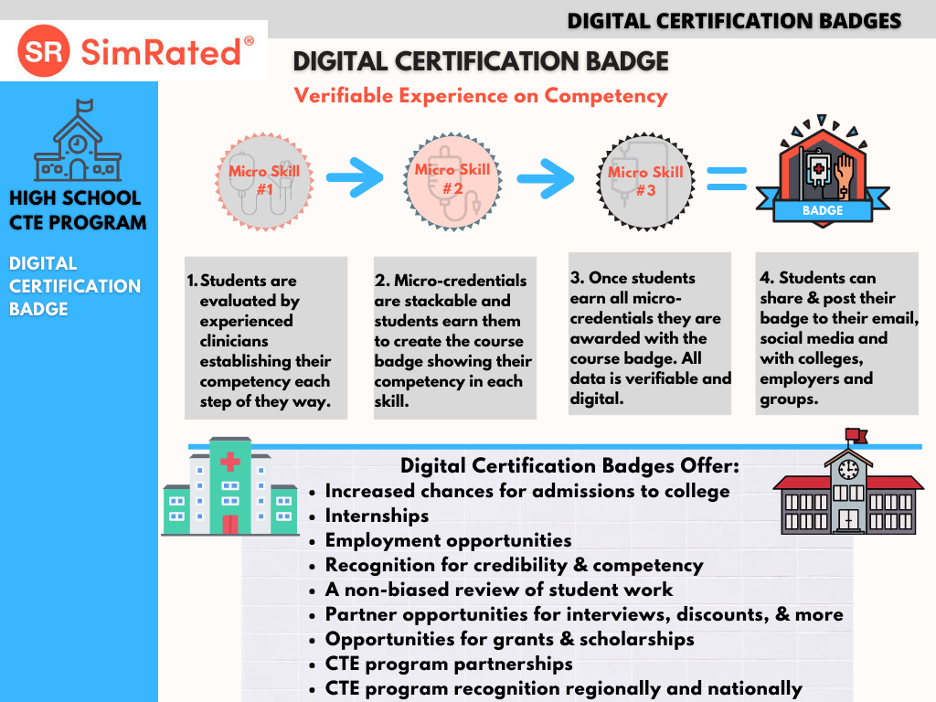Are Digital Badges the Future for Healthcare?
As digital badges become more and more accepted by many industries, those of us in healthcare have started to consider the usefulness of badges in regards to developing and recruiting talent. Could this be a game changer in the healthcare industry or just a sticker for certification pathways already in place?
In the recent article “Digital Badges Give Learners a Competitive Edge in Hiring and Career Advancement,” Jon Wollenhaupt provides an overview of digital badges from the perspective of the California Community Colleges and the development of students in high school. While this article covered soft-skill topics in general, I would like to revisit this concept with a focus on healthcare.
Healthcare as an industry has been slow to adopt digital badging in medical procedures and for good reason; the lack of standards. When it comes to performing a medical procedure, healthcare employers are reluctant to trust training and assessment from anyone but their own clinical educators or the reputable educational institutions. After all, it is the patient's outcomes which are at stake. In order to gain acceptance in healthcare, digital badging must be rigorous and transparent, while ensuring the earner is competent in the actual procedure.
With regards to the rigor supporting a medical procedure digital badge, a digital badge must be strict in the method of evaluation, the domains being evaluated and the content of the evaluation. The domains specific to medical procedures include the cognitive knowledge of the procedure, the steps required to perform the procedure, the hands on dexterity and the ability to accommodate the variety of anatomy and pathophysiology that patients provide. Thus, the method of evaluation cannot be simply a multiple choice exam as this does not capture the scope of a procedure. Multiple choice can be used to evaluate a single component and that is the cognitive knowledge underpinning the procedure. The most effective method of evaluation of procedure steps and manual dexterity is simulation-based assessment. Simulation-based assessment allows for a standardized setting without risk of patient harm by a learner. Finally, clinical evaluation of the learner must be in the clinical environment with supervising clinicians. Beyond the challenges just presented, transparency of evaluation is necessary.
Can a digital badge address all of the rigor required in validating a medical procedure and provide something more to the earner and viewer?
Healthcare practitioners are versed in the scientific method and are thus skeptical by nature. So if a learner presents a digital badge to a supervising clinician with the hopes of performing the procedure under their supervision, it must be immediately clear the step taken and evaluation used leading to this badge. Digital badges do have this capability if used to their full potential.
Digital badges can provide the metadata digitally available to the supervising clinician. This metadata can include the domains of evaluation, the assessment methods and examples of earner’s content and competency. In some situations, a video of the procedure being performed in the simulation setting could be available. When clinicians are going to take the risk of patient complications on their license in order to teach a learner, based on a digital badge, all of these components need to be immediately transparent and available. While there are some unique challenges for medical procedure badging there are no barriers technically to the process.
Technical Scope for Medical Procedure Digital Badging:
Earner:
Enrolls in procedure course
Submits evidence of competency per course requirements
Evaluated by clinicians for simulation-based performance
Issued digital badge based on meeting and providing evidence of competency in course requirements
Badge is issued to earner with metadata that informs the viewer about:
Real-time evidence that is time and date stamped
Requirements to earn digital badge
Badge issuers expertise
Clinician expertise (i.e. name, title, place of employment)
Examples of competency (video, exams, evidence)
Expiration or renewal date for badge (if applicable)
Medical Digital Badges in College & Career
Digital badges in the medical field are just beginning to make an appearance. Many healthcare associations, colleges/universities and employers are looking to digital badges for mapping of procedures/process and talent development/recruitment. For earners a digital badge provides recognition of verifiable experience that can:
Increase chances for admissions
Promote employment opportunities
Provide recognition by industry partners (partners can recognize digital badges as “gold standard” in competency)
Allow for organizations to seek specific employment skills and talent
Provide talent development in the workplace
Support equity and access in the career journey
See our SimRated Digital Badge Certificate Courses
SimRated Digital Badges & Platform
The SimRated team, with their unique background in medicine, education, assessment and technology has developed a solution addressing each of these obstacles leading to digital credentials which are rigorous, transparent and appropriate for healthcare. SimRated’s online platform provides education in the procedure background along with a video and checklist to train the steps to safely and effectively conduct the procedure. In addition, our platform provides an assessment of cognitive knowledge and simulation-based assessment of the learner ability to perform the procedure using the correct steps. Completion of the SimRated process results in a digital badge which can be presented to a supervising clinician prior to performing the supervised procedure. Finally, the supervising clinician can log the learner’s performance in the clinical setting directly on the platform. If you would like to hear more about the SimRated methodology and our digital badges, please contact us at info@simrated.com.


